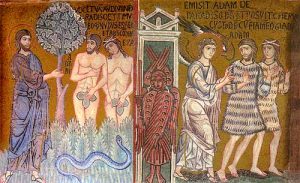 The readings from Genesis on the Fridays of the Great Fast point like an arrow to the covenant made on Good Friday, when our Lord gave his body and blood as a new covenant for the life of the world.
The readings from Genesis on the Fridays of the Great Fast point like an arrow to the covenant made on Good Friday, when our Lord gave his body and blood as a new covenant for the life of the world.
The first and second Fridays tell of the breaking of covenants, of the covenant with Adam and Eve when they ate of the fruit of the tree of the knowledge of good and evil, and of the decision of God to destroy the human race because of its wickedness. The third Friday is the renewal of the covenant with Noah, and the fourth Friday is the covenant with Abraham. On the fifth Friday, Abraham replaces the disobedience of Adam and Eve with obedience to God in the sacrifice of his beloved son. However, God does not want this sacrifice, though he allows his only-begotten Son to die on the cross for the salvation of the human race. The sixth Friday, the funeral of Joseph, looks forward to the burial of Christ, who through his death will trample upon death.
This is our Fast, it is the making of a new covenant with God. When Adam and Eve sinned, they were expelled from paradise, and stationed a cherub with a fiery sword to guard the way to the tree of life. Four curses were imposed on Adam and Eve, on Eve, pain in childbirth, and servitude to her husband, on Adam, hard labor and death.
In the new covenant of our Lord Jesus Christ, the curse is abrogated, as the Kontakion of the Third Sunday of the great Fast proclaims, “No longer does the flaming sword guard the gates of Eden, for the tree of the cross has come to quench it wondrously. The sting of death and the victory of Hades have been driven out.”
The curse is truly abrogated, but in God’s mystical and wondrous way. In childbirth, the woman still suffers pain, but her anguish gives way to joy because of new life (John 16:21), the marital relations between man and woman are now marked by mutual love and respect, in the subtle reading of Ephesians 5:9-19, the harshness of labor is eased by the sabbath rest (Hebrews 4:9). Death remains, and even the Son of God must suffer death (“Christ has redeemed us from the curse of the law, having become a curse for us, for it is written, ‘Cursed is everyone who hands on a tree,” (Galatians 3:10, quoting Deuteronomy 21:23).
In today’s reading, we hear the terrible words which are proclaimed aloud, “By the sweat of your brow you shall eat bread, until you return to the ground, from which you were taken; for you are dust, and to dust you shall return,” but in the serenity of the Great Fast, other words, silently now but soon to be proclaimed, are spoken,“to those in the grave he granted life,” “you will know that I am the Lord, when I open your tombs to lead you, my people, up from their graves (Ezechiel 37:13), and “I am the resurrection and the life. (John 11:25)” God seizes death by the throat, and turns the curse of death into life, for “by death he trampled upon death.”
Meditation by Archpriest David Petras
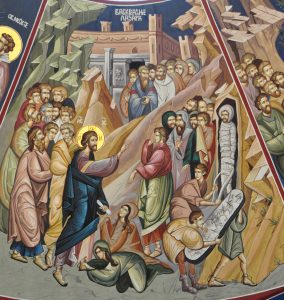 Jesus said to her [Martha], “Your brother [Lazarus] will rise again.” Martha said to him, “I know that he will rise again in the resurrection at the last day.” Jesus said to her, “I am the resurrection and the life; whoever believes in me, though he die, yet shall he live, and whoever lives and believes in me shall never die. Do you believe this?” (John 11:23-26)
Jesus said to her [Martha], “Your brother [Lazarus] will rise again.” Martha said to him, “I know that he will rise again in the resurrection at the last day.” Jesus said to her, “I am the resurrection and the life; whoever believes in me, though he die, yet shall he live, and whoever lives and believes in me shall never die. Do you believe this?” (John 11:23-26)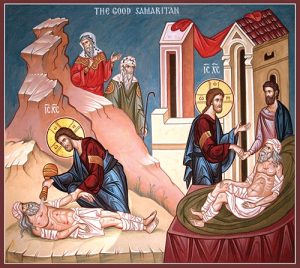 Matins
Matins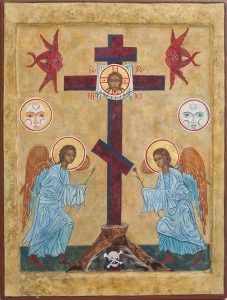 The first half of the Great Fast tells us the stories of Adam and Eve and their children, and the flood of Noah. It is a story of the creation of a perfect world and how that has been marred by human sin. It tells of the end of paradise, “The Lord God therefore banished him from the garden of Eden, to till the ground from which he had been taken. He expelled the man, stationing the cherubim and the fiery revolving sword east of the garden of Eden, to guard the way to the tree of life” (Genesis 3:23-24).
The first half of the Great Fast tells us the stories of Adam and Eve and their children, and the flood of Noah. It is a story of the creation of a perfect world and how that has been marred by human sin. It tells of the end of paradise, “The Lord God therefore banished him from the garden of Eden, to till the ground from which he had been taken. He expelled the man, stationing the cherubim and the fiery revolving sword east of the garden of Eden, to guard the way to the tree of life” (Genesis 3:23-24).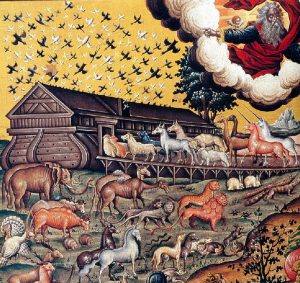 One the key parts of the Great Fast is attending to Baptism. Do we realize the import of Baptism and its roots?
One the key parts of the Great Fast is attending to Baptism. Do we realize the import of Baptism and its roots?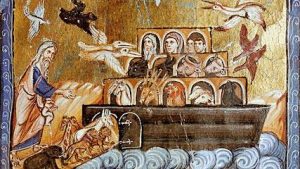 During this week, at Vespers, we read the story of the flood and the salvation of the righteous man Noah and his family. At first, this might seem to be the dark side of God, and on Friday, we heard: “When the Lord saw how great the wickedness of human beings was on earth, and how every desire that their heart conceived was always nothing but evil, the Lord regretted making human beings on the earth, and his heart was grieved. So the Lord said: I will wipe out from the earth the human beings I have created, and not only the human beings, but also the animals and the crawling things and the birds of the air, for I regret that I made them.” The story of the flood may have some historical basis, as a great flood in the Mediterranean basin in pre-history, but the story is iconic. (Noah could not have brought all the animal species on the ark.) The story tells us that the “wages of sin is death” (Romans 6:23).
During this week, at Vespers, we read the story of the flood and the salvation of the righteous man Noah and his family. At first, this might seem to be the dark side of God, and on Friday, we heard: “When the Lord saw how great the wickedness of human beings was on earth, and how every desire that their heart conceived was always nothing but evil, the Lord regretted making human beings on the earth, and his heart was grieved. So the Lord said: I will wipe out from the earth the human beings I have created, and not only the human beings, but also the animals and the crawling things and the birds of the air, for I regret that I made them.” The story of the flood may have some historical basis, as a great flood in the Mediterranean basin in pre-history, but the story is iconic. (Noah could not have brought all the animal species on the ark.) The story tells us that the “wages of sin is death” (Romans 6:23).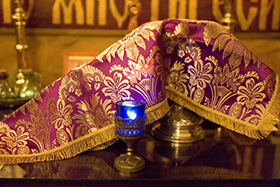 Communing from the Body and Blood of the Master during the period of spiritual combat.
Communing from the Body and Blood of the Master during the period of spiritual combat.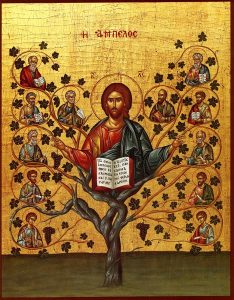 To inspire our prayer today, here are 2 texts from the Liturgy and a reflection on them.
To inspire our prayer today, here are 2 texts from the Liturgy and a reflection on them. The readings from Genesis on the Fridays of the Great Fast point like an arrow to the covenant made on Good Friday, when our Lord gave his body and blood as a new covenant for the life of the world.
The readings from Genesis on the Fridays of the Great Fast point like an arrow to the covenant made on Good Friday, when our Lord gave his body and blood as a new covenant for the life of the world.